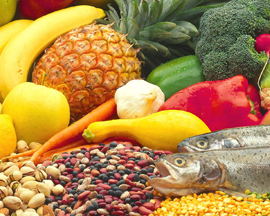Nutrition Questions and Answers
 Vital Health Zone is proud to announce Anastacia Sampson , who is our resident naturopathic expert and who is available to answer questions about nutrition and health.
Vital Health Zone is proud to announce Anastacia Sampson , who is our resident naturopathic expert and who is available to answer questions about nutrition and health.
Anastacia Sampson has a private practice and is available for consultation in a number of ways.
Anastacia Sampson will answer your nutrition-related questions.
Q: I have been stressed for about a year and would like to know what damage has this done to my body?
My doctor just told me to drink water, and wasn't concerned. I didn't think much of that as a solution.
After a blood test I am told that my veins are inflamed, and I am at risk of a stroke.
I am 115 lbs 5'1" and I eat as much fruits and veggies as I can, I take a multivitamin and my diet is full of low carbohydrates.
What should I do besides getting a second opinion?
Advertisement
 A: To begin you probably require another opinion and it is not safe to make recommendations without knowing your full medical history. However, to guide you along the way you have been very wise in selecting fruits and vegetables! They are our prime vitamin C sources and this is vitamin that has a role in an anti-inflammatory diet. What you can do is avoid all meats such as the red meats and chicken skin to avoid any omega 6 fatty acids. Omega 6 is converted to prostaglandins that are pro-inflammatory. Try seek fatty fish (mackerel, salmon, sardines, trout) to gain omega 3 fatty acids, which are anti-inflammatory by inhibiting those pro-inflammatory prostaglandins. Prostaglandins are essential and needed hormone like substances, but at levels that are balanced.
A: To begin you probably require another opinion and it is not safe to make recommendations without knowing your full medical history. However, to guide you along the way you have been very wise in selecting fruits and vegetables! They are our prime vitamin C sources and this is vitamin that has a role in an anti-inflammatory diet. What you can do is avoid all meats such as the red meats and chicken skin to avoid any omega 6 fatty acids. Omega 6 is converted to prostaglandins that are pro-inflammatory. Try seek fatty fish (mackerel, salmon, sardines, trout) to gain omega 3 fatty acids, which are anti-inflammatory by inhibiting those pro-inflammatory prostaglandins. Prostaglandins are essential and needed hormone like substances, but at levels that are balanced.
A great anti-inflammatory and anti-coagulant (to prevent strokes) is an enzyme named bromelain. This comes from pineapple, especially the stem and it may be of great aid for you. Phlebitis (inflammation of the veins) can be assisted by aloe vera, as this plant is anti-inflammatory. Then do try find one without the aloin to avoid the laxative effect that can come with aloe vera preparations. Aloe vera will additionally support the immune system and digestion, which are compromised when we are under strain/stress.
Do try get to the source of your stress. If it is your lifestyle, aim for stress management. In the mean time, rescue homeopathic drops or tablets can be of aid with guidelines, such as avoid coffee when taking homeopathic medicine. Coffee destroys the effectiveness of the subtle medicines. Chamomile tea may help with stress. Generally there are many herbal preparations for stress.
Whenever we are under any type or form of stress our nutritional requirements increase so do keep up on the multi-vitamin supplementation. Low carbohydrates is fine but having complex carbohydrates such as whole oats and brown rice is supportive. Oats are energy building foods and support times of stress, indeed oat tinctures have been utilised for nervousness, stress and strain. Do allow yourself to have nourishing complex carbohydrates in whole foods and take time for yourself!
Always listen to your body and if you feel you need attention do seek it, even second opinions.
Please note that the information provided is for educational purposes only and is not meant to diagnose or treat medical conditions. Consult with your medical physician regarding appropriateness of using supplements in your healing process.
Advertisement
Enjoy better health!


